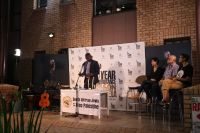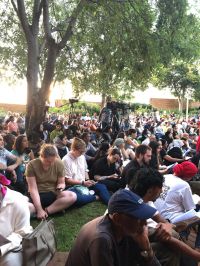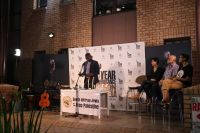A Shabbat for Palestine
Disturb us, Adonai, ruffle us from our complacency;
Make us dissatisfied. Dissatisfied with the peace of ignorance,
The quietude which arises from a shunning of the horror, the defeat,
The bitterness and the poverty, physical and spiritual, of humans.
Shock us, Adonai, deny to use the false Shabbat which gives us
The delusions of satisfaction amid a world of war and hatred;
Wake us, O God, and shake us
from the sweet and sad poignancies rendered by
half-forgotten melodies and rubric prayers of yesteryears
Disturb Us, Mishkan Tefilah, 173

During the struggle against Apartheid in South Africa, many Jewish people stood and fought against discrimination and hate and contributed their skills and energy to the movement. There were also many Jewish people, even around the world, who supported the Apartheid government - notably, the Zionist movement in Israel. As we met in the evening of Friday the 16th for a Shabbat against the genocide taking place against Palestine, these histories and connections were brought to the forefront. The Jewish community in Johannesburg, organised by South African Jews for a Free Palestine and the Nelson Mandela Foundation, came together and held hands with people from all walks of life to say that what is being done by the Israeli government is not done in the name of all Jews - that Jews remember and know what oppression means and that they will not be silent as genocide is committed in their name.
The conditions in Gaza and the genocidal actions of the Israeli apartheid ethnostate are extremely difficult to witness, even if one seriously contends with the Hamas attack on the 7th of October. No reasonable person with a conscience can ever justify Israel’s military campaign against the people of Palestine. Even as early as 2009, Israeli historian Avi Shlaim, professor of international relations at the University of Oxford, wrote in the Guardian that “The Biblical injunction of an eye for an eye is savage enough. But Israel’s insane offensive against Gaza seems to follow the logic of an eye for an eyelash.”
I struggled with the concept of this convening initially. I’ve been struggling with notions of Whiteness and Blackness concerning Israel’s war against Palestine. On the face of it, this conflict is an instance of Whiteness and White people committing extraordinary acts of violence against Blackness and Black people. The event seemed to me as White apologism in defence of Jewish people, as if trying to say “Not All Jews.” And with all of my apprehension, it wasn’t easy, sitting on the lawns of the Nelson Mandela Foundation, to be understanding with an elderly White woman who asked me (a Black person) to move ten places down, into the sun, so that she can call her friends and they can all sit together in the shade I had found. But she was old and needed a comfortable place to sit, perhaps more than I did. And, as far as old people go, she was very polite if not a little bit deft.
As the sun began to set, and the service was about to begin, I felt struck by all the different communities that had come together for a Shabbat for Palestine. Groups of young activists recognising and warmly holding each other, families greeting and asking if the children are well. I was sitting behind a pair of Indian women, old enough to be aunties, who were sharing expertise on how to raise children well and Googling the word “Adonai.” I felt safe enough to open my heart and listen to the service with an open mind.
The event was significantly oversubscribed and we had to move the service from the auditorium to the lawns to fit the over 400 RSVPs received and there were deep concerns over catering. When the challah and Kiddush were brought out, we were not certain that these 4 loaves with feed all 400 of us. But they did and there was so much spare that families took home big loaves home for that matter. As the service went on, I began to appreciate the seriousness of these White people’s commitment to liberating Palestine from Israeli oppression - even beyond calling for a ceasefire now. This was not apologism. This a moment of authentic solidarity with the people of Palestine.

I felt especially moved by the conviction demonstrated in the prayers and the songs in the service. For instance, we said a prayer titled “A Prayer for Reparation and Restoration” written by Rabbi Brant Rosen JVP Rabbinic Council. Here was a prayer that did not resign the state of the world to God’s will, but a prayer that wrestled with God, a prayer that did not cast away all material conditions of the world but that was bringing the particular, the political, and the divine into conversation with each other.
“Grant us the courage to dismantle systems of oppression - and when they are no more, let us dedicate our wealth and resources toward the well-being of all,” we prayed.
After the service, we had the honour of being in conversation with Minister of Justice and Correctional Services, Mr Ronald Lamola; Advocate Adila Hassim SC; as well as Associate Professor of Postcolonial and Postmodern Literature at Gaza's al-Aqsa University, Mr Haidar Eid. Director-General of DIRCO, Mr Zane Dangor, joined the conversation at the end in a Q&A with the audience cum congregation.
Advocate Hassim opened the discussion by reflecting on the reality that court cases, such as the International Court of Justice case where South Africa accused Israel of committing genocide in Gaza, do not execute justice on their own, and that justice is only possible if a groundswell of people feel emboldened enough to make it. She reminded us that the October 7th attack did not take place in a vacuum but existed in a long dialectical of Israel almost entirely decimating Palestinian land and cleansing hundreds and thousands of Palestinian neighbourhoods. She reminded us that Palestinians still wear the keys of their demolished homes around their necks because of their conviction that they will return home. Importantly, Advocate Hassim underlined the reality that antisemitism still exists today and must be fought. What she highlighted was that the acts of the Israeli military in Palestine place the lives and safety of Jewish people all around the world at risk, not just in Israel.
Minister Lamola looked over the crowd that had gathered, and poignantly shared with us how South Africa, and indeed this gathering, demonstrates that coexistence is possible. That it is possible to have gone through decades of apartheid and centuries of colonialism and come out as a unified nation, a sentiment echoed by Professor Eid.
Professor Eid, who has had his birth home cleansed by the Israeli military and who has been forcibly removed three times remarked on the fact that over 2,000 people have been killed by Israel since the ICJ interim ruling that ordered them to stop the genocide.
Importantly, Professor Eid pushed our senses of what justice is needed in Palestine. Over the past few decades, the Two-State solution has been presented as the most realistic solution to the conflict. He insisted that the Two-State solution is racism par excellence, by comparing it to the Bantustan system in South Africa and how reviled and rejected it was as a sustainable solution to Apartheid. The only justifiable outcome, he implored, was a secular, democratic state for all of the inhabitants of the region.
After the service and the discussion, I felt changed. For the first time, I felt that calling for a ceasefire was not enough. That we are able and that it is our duty as people of conscience to strive for lasting justice and peace in Palestine, and that genocidal states everywhere will be dismantled by the convictions and actions of lay people all around the world. In times of great oppression, it is easy to accept the minuscule concessions of the oppressor and have those concessions decide the horizons of possibility. It is our responsibility to think beyond the oppressor’s comfort zone and insist on a free Palestine, on the right of return, and on a secular future where all inhabitants coexist in a just peace.

Gallery: Shabbat for Palestine
The Jewish community in Johannesburg, organised by South African Jews for a Free Palestine and the Nelson Mandela Foundation, came together in February 2024 and held hands with people from all walks of life to say that what is being done by the Israeli government is not done in the name of all Jews - that Jews remember and know what oppression means and that they will not be silent as genocide is committed in their name.